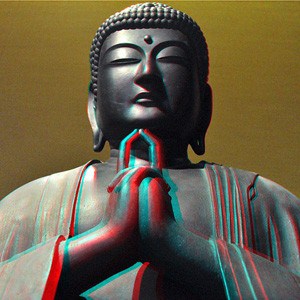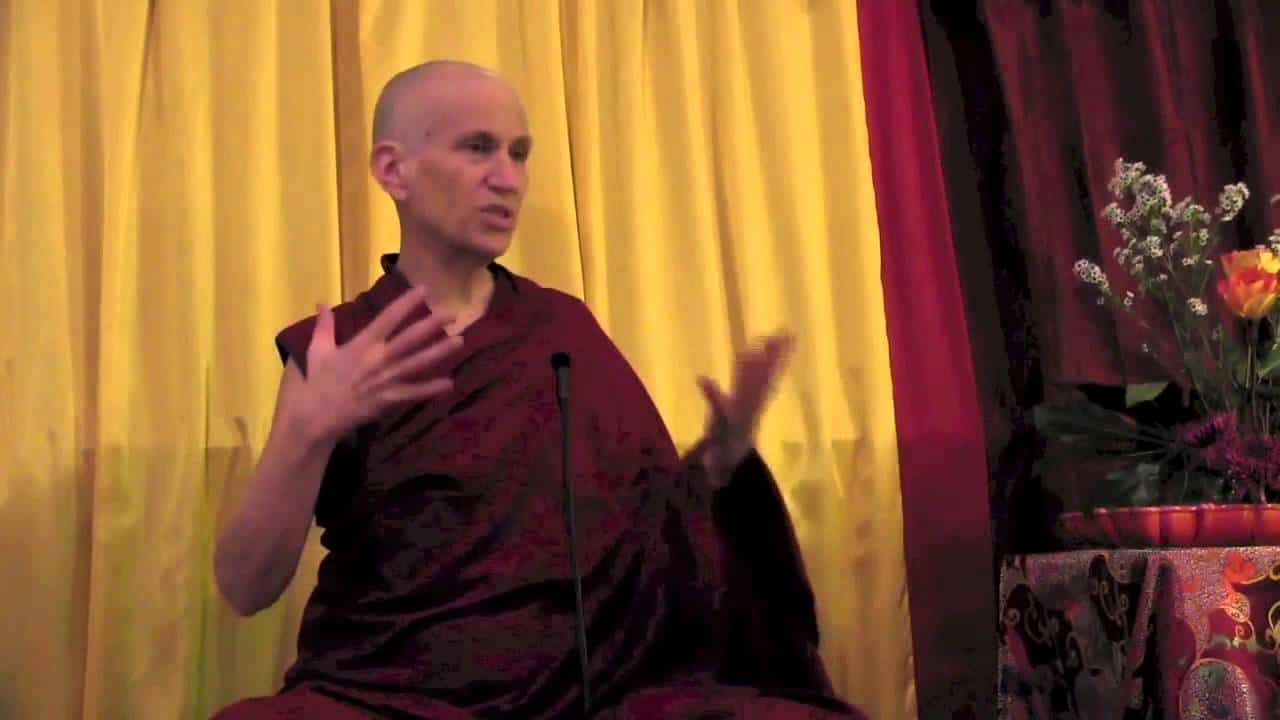Verse 92: The basis of good and evil
Part of a series of talks on Gems of Wisdom, a poem by the Seventh Dalai Lama.
- The “devil” of our own self-centeredness
- The importance of guarding our state of mind
- Examining our motivation
- Our mind is the basis of samsara and nirvana
Gems of Wisdom: Verse 92 (download)
What is the thing to be guarded that is that is the basis of help or harm?
The state of one’s own mind, the basis of both good and evil.
Actually, as Buddhists we don’t talk much about “evil” in the same way that it’s spoken of in (e.g.) Christianity. I usually change that word to something like “negativity,” because “evil,” to me, implies something out there that is externally evil that afflicts you. And Buddhism really doesn’t have that kind of notion. It’s much more the thing of if we’re going to talk about “evil,” the real “evil” is in here [our heart], it’s our own ignorance and all of our afflictions.
I remember one time going to a school outside of Seattle (they invited me to talk at a high school) and one boy asked me there if we believed in the devil. The external embodiment of evil. And I said no. I said, you know, the real “devil” is our own self-centeredness.
So when it talks about here the state of mind that is the basis of goodness and negativity, to really guard the state of our mind, because when afflictions are manifest then negativity gets created, then suffering ensues. When we are able to manage our mind and cultivate our good qualities, then virtuous mental factors arise, virtuous karma is created, happiness ensues. It’s really all dependent on what’s going on inside here [our heart].
That’s why motivation is so important in Buddhism. We may do lots of pujas and prayers and chantings and offering and all sorts of external things, but the real thing that makes any of those become Dharma practice, and any of them become valuable, is the state of our mind. You can do any of those practices with an aspiration for full awakening, with an aspiration for liberation, with an aspiration for a good life, with an aspiration to have a good reputation, with a wish to be famous and be known as generous or very talented and well-cultivated…. There are so many different kinds of motivations that we can have for doing the exact same external action. That’s why the state of our mind is so important, because the result of the action, karmically, the long-term result, is going to depend on the state of our mind.
Also, our mind is the basis for samsara and nirvana. Samsara, the state of cycling, taking up one body after another without control, or under the control of afflictions and karma. And nirvana, the state that is the cessation of that, the freedom from that, the real liberty that we seek. So all of that is on the basis of the mind. It’s not like samsara’s over there and nirvana’s over here. And so we go to samsara and then somehow we find the correct rocket ship to board that takes us to nirvana that’s over here. They’re not actually external places. In a conventional sense samsara has different locations and different realms and things like that. But actually they’re very much states of mind. So this same mind that we have—whose conventional nature is clarity and awareness, whose ultimate nature is empty of inherent existence—that mind, depending on how we use it, can be samsara or it can be in the state of nirvana. That exact same mind. When you’re talking about the nature of the mind. Of course, the mind has to change, so it’s not EXACTLY the same mind. Because the mind in samsara has all the afflictions and defilements and karmas, and the mind in nirvana—especially the non-abiding nirvana of a buddha—is free of all of that.
That’s why it says that it’s so important to guard the mind. People can steal all of our possessions and we may say, “Oh no, all my stuff is gone!” But that’s really not so bad. But when we let our virtue be stolen by our own afflictions, that’s a real loss. That’s a real loss because of the importance of the state of our mind.
[In response to audience] Basically, if somebody’s in the hell realm it’s because of their negative karma. If they do strong purification—especially by generating bodhicitta…. Because there’s the story of the Buddha in a previous lifetime being in the hell realms pulling a cart—he was pulling this flaming cart along with somebody else—and he generated great compassion thinking “may I bear the suffering of pulling this cart in the hell realm,” and at the moment, because of the virtuous mind that’s wishing to take on the suffering of somebody else, immediately he was born, I don’t know, in the god realm or somewhere else.
[In response to audience] It would be difficult. Because it’s difficult to generate any positive thought in the hell realm. But for somebody who’s a bodhisattva, who could generate that thought, it could certainly happen. And even, perchance, if they’re some ordinary being…. Because the lower level bodhisattvas are ordinary beings who could generate that kind of thought.
Venerable Thubten Chodron
Venerable Chodron emphasizes the practical application of Buddha’s teachings in our daily lives and is especially skilled at explaining them in ways easily understood and practiced by Westerners. She is well known for her warm, humorous, and lucid teachings. She was ordained as a Buddhist nun in 1977 by Kyabje Ling Rinpoche in Dharamsala, India, and in 1986 she received bhikshuni (full) ordination in Taiwan. Read her full bio.


